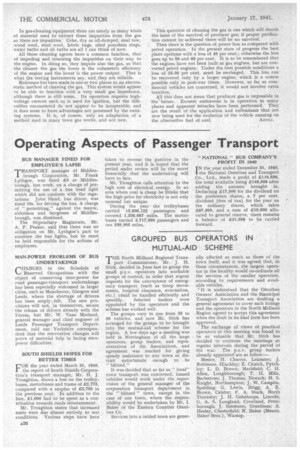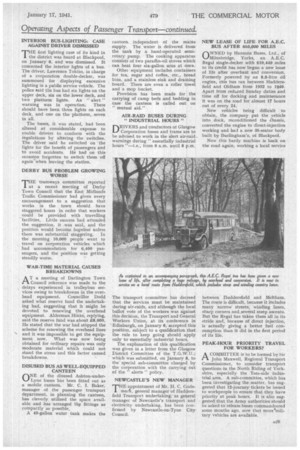GROUPED BUS OPERATORS IN MUTUAL-AID SCHEME
Page 28

Page 31

If you've noticed an error in this article please click here to report it so we can fix it.
THE North Midland Regional Trans' port Commissioner, Mr, J. H. Stirk, decided in June last to group the small p,s.v. operators into workable ,groups of control, in order that urgent requests for the conveyance of emergency transport (such as troop movements, hospital clearance, evacuation, etc.) cduld be handled efficiently and speedily. Selected leaders were appointed by the operators and the scheme has worked well.
• The groups vary in size from 35 to 50 vehicles, and now Mr. Stirk has arranged for the groups to be brought into the mutual-aid scheme for the region. A few days ago a meeting was held in Nottingham of all the large operators, group leaders, and representatives of the Association's, and agreement was reached for giving speedy assistance to any town or district unfortunate enough to be " blitzed."
It was decided that so far as " local" town transport was concerned, loaned vehicles would work under the supervision of the general manager of the corporation transport department in the " blitzed " town, except in the case of one town, where the responsibility would be undertaken by Mr. I. Baker of the Eastern Counties Omnibus Co.
Services into a raided town are gener
ally affected as much as those of the town itself, and it was agreed that, in these circumstances, the largest operator in the locality would co-ordinate all the services of the smaller operators, according to requirements and available vehicles.
It is understood that the Omnibus Owners' Association and the Municipal Transport Association are drafting a general agreement to cover such hirings and the operators in the North Midland . Region agreed to accept this agreement when the draft in its final form has been approved.
The exchange of views of practical operators at this meeting was found to be so valuable that Mr. Stirk has decided to continue the meetings at regular intervals during the period of the war. The p.s.v. group leaders already appointed 'are as follow:— Messrs. H. Cleaver, Leicester; J. Robinson, Hinckley; E. Church, Pytchley; L. D. Brown, Markfield; C. H. Allen, Loughborough; T. H. Mills, Barlestone; J. Thomas, Newark; H. S. Xnight, Northampton; J. W. Camplin, Spalding; G. Lewis, Brigg; A. E. Brown, Caistar; F. A. Stark, North Thoresby; J. H. Gelsthorpe, Lincoln; G. A. S. Longland, Crowland, Peterborough; J. Simmons, Grantham; A. Heeley, Chesterfield; R. Baker (Messrs. Baker Bros.), Warsop.
INTERIOR BUS-LIGHTING: CASE AGAINST DRIVER DISMISSED THE first lighting case of its kind in 1 the district was heard at Blackpool, on January 6, and was dismissed. It concerned the interior lights of a bus. The driver, Lawrence Tokins, in charge of a corporation double-decker, was summoned for displaying excessive lighting in a public service vehicle. The police said the bus had six lights on the upper deck, six on the lower deck, and two platform lights. An " alert" warning was in operation. There should have been three lights on each deck, and one on the platform, seven in all.
The buses, it was stated, had been altered at considerable expense to enable drivers to conform with the regulations by altering the switches. The driver said he switched on the lights for the benefit of passengers and to avoid accidents. He had on this occasion forgotten to switch them off again when leaving the station.
DERBY BUS PROBLEM GROWING WORSE
rrHE tramways committee reported 1 at a recent meeting of Derby Town Council that the East Midlands Traffic Commissioner had given every encouragement to a suggestion that works in the town should have staggered hours in order that workers could be provided with travelling facilities, Little success had attended the suggestion, it was said, and the position would become hopeless unless there was substantial staggering. In the morning 10,000 people want to travel on corporation vehicles which had accommodation for 6,400 passengers, and the position was getting steadily worse.
WAR-TIME MATERIAL CAUSES BREAKDOWNS
AT a meeting of Darlington Town Council reference was made to the delays experienced in trolleybus services owing to breakdowns in the overhead equipment. Councillor Dodd asked what reserve fund the undertaking had, suggesting that it might be devoted to renewing the overhead equipment. Alderman Kinks, replying, said the reserve fund was about £8,000. He stated that the war had stOpped the scheme for renewing the overhead lines and it was impossible to get the equipment now. What was now being obtained for ordinary repairs was only moderate material which could not stand the stress and this factor caused breakdowns.
DISUSED BUS AS WELL-EQUIPPED CANTEEN
(-NNE of the disused Ashton-underLyne buses has been fitted out as a mobile canteen. Mr. C, I. Baker, manager of the passenger transport department, in planning the canteen, has cleverly utilized the space available and has arranged the fittings as compactly as possible.
A 40-gallon water tank makes the canteen independent of the mains supply. The water is delivered from the tank by a hand-operated semirotary pump. The cooking apparatus consists of two paraffin-oil stoves which can heat four six-gallon urns at once.
Othei equipment includes containers for tea, sugar and coffee, etc., bread bins, and a stainless sink and draining board. There are even a roller towel and a mop bucket.
Provision has been made for the carrying of camp beds and bedding in case the canteen is called out on "mutual aid."
AIR-RAID BUSES DURING "INDUSTRIAL HOURS"
DRIVERS and conductors of Glasgow Corporation buses and trams are to be advised to work in the alert air-raidwarnings during" essentially industrial hours "—i.e., from 6 a.m. until 8 p.m.
The transport committee has decreed that the services must be maintained during air-raids, and although the local ballot vote of the workers was against this decision, the Transport and General Workers Union, at its conference in Edinburgh, on January 6, accepted this position, subjeCt to a qualification that the rule to keep going should apply only to essentially industrial hours.
The explanation of this qualification was given in a letter from the Glasgow District Committee of the T,G.W.U.; which was submitted, on January 8, to the special sub-committee charged by the corporation with the carrying out of the " alerts" policy.
NEWCASTLE'S NEW MANAGER
THE appointment of Mr. H. C. Godsmark, general manager of Huddersfield Transport undertaking,. as general manager of Newcastle's transport and electricity undertaking, has been confirmed by Newcastle-on-Tyne City Council.
NEW LEASE OF LIFE FOR A.E.C. BUS AFTER 610,000 MILES
OWNED by Hansons Buses, Ltd., of Milnsbridge, Yorks, an A.E.C. Regal single-decker with 610,449 miles to its credit has now begun a new lease of life after overhaul and conversion. Formerly powered by an 8.8-litre oil engine, this bus ran between Huddersfield and Oldham from 1932 to 1840. Apart from reduced Sunday duties and time off for docking and maintenance it was on the road for almost 17 hours out of every 24.
New vehicles being difficult to obtain, the company put the vehicle into dock, reconditioned the Chassis, converted the engine to direct-injection working and had a new 35-seater body built by Burlingham's, of Blackpool.
Now this hardy machine is back on the road again, working a local service between Huddersfield and Meltham. The route is difficult, because it includes many narrow streets, winding lanes, sharp corners and several steep ascents. But the Regal has taken them all in its stride and, because of direct injection, is actually giving a better fuel consumption than it did in the first period of its life.
PEAK-HOUR PRIORITY TRAVEL FOR WORKERS?
ACOMMITTEE is to be formed by Sir John Maxwell, Regional Transport Commissioner, to consider transport questions in the North Riding of Yorkshire, especially the Tees-side industrial area. A sub-committee, which has been investigating the matter, has suggested that 12-journey tickets be issued to workpeople to ensure that they have priority at peak hours. It is also suggested tha,t the Army authorities should be asked to release buses commandeered some months ago, now that more*military vehicles are available.




















































